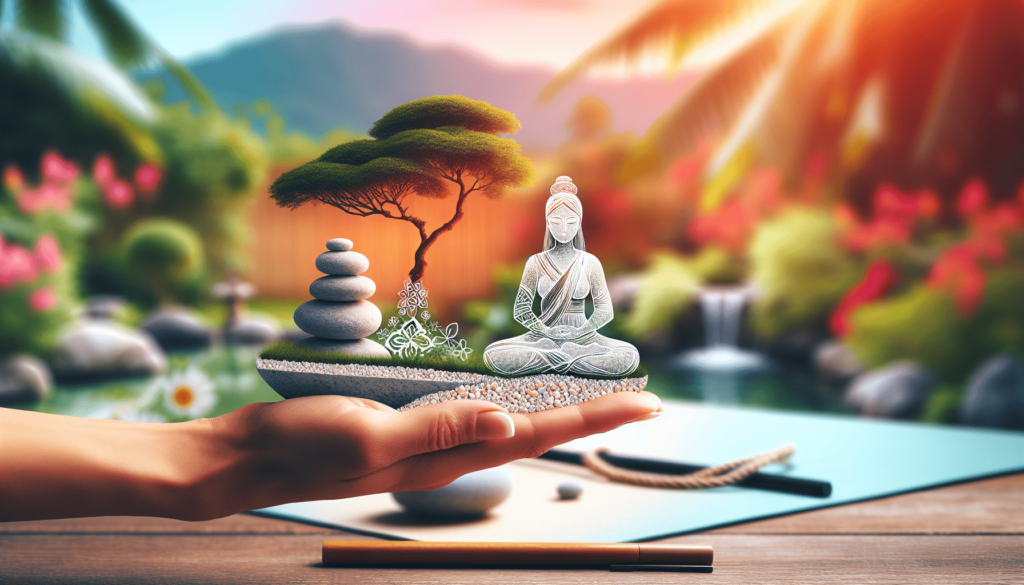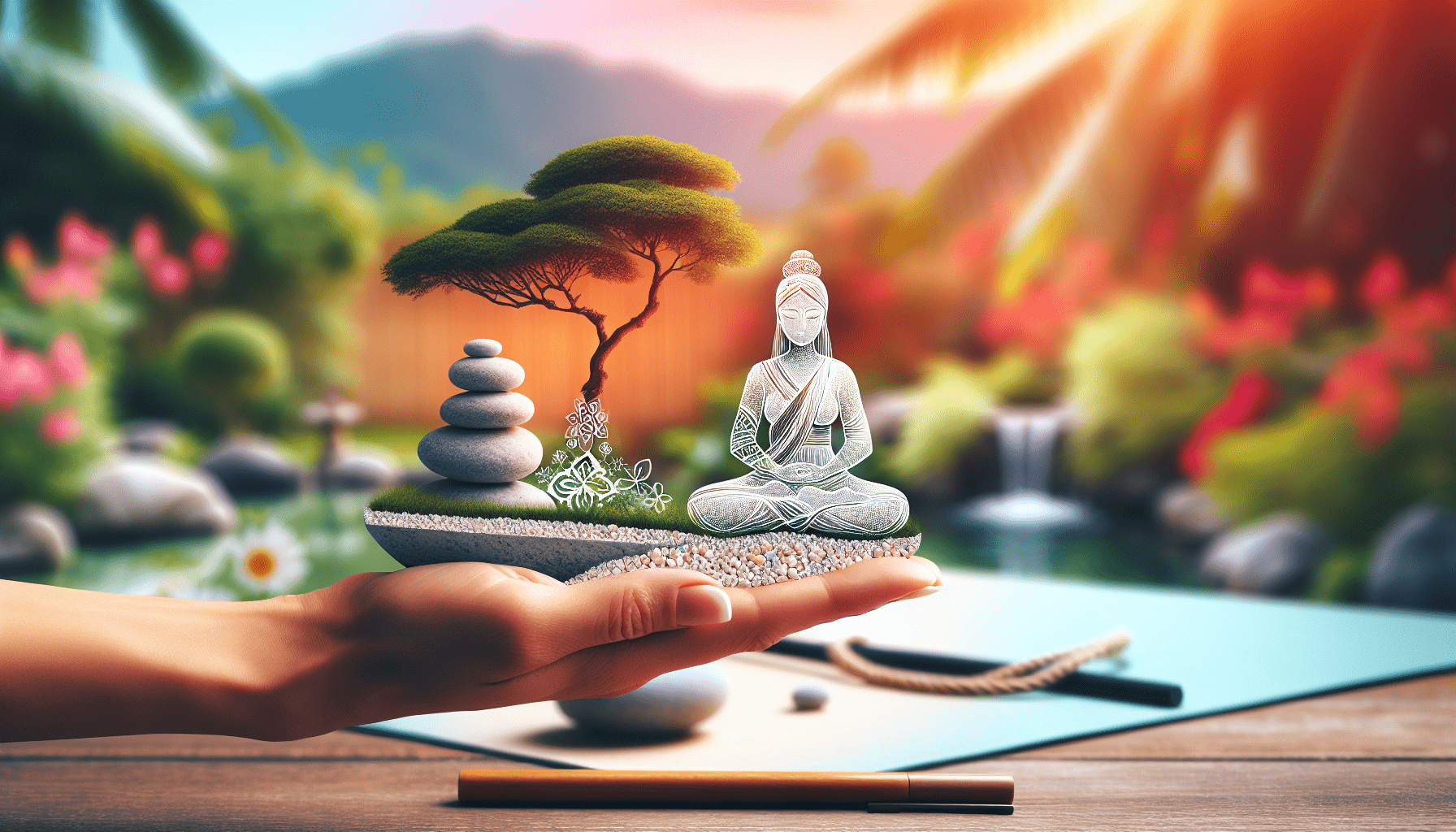Living a busy life can often mean neglecting our well-being and focusing solely on our daily tasks. However, it is essential to prioritize our health and adopt a holistic lifestyle. In this article, you will discover valuable tips and practices that can easily be incorporated into your hectic schedule. By incorporating simple changes into your daily routine, you can promote balance, enhance your overall well-being, and achieve a more holistic approach to life. So, let’s explore some holistic lifestyle tips that are perfect for busy individuals like you.

Time Management
Prioritize your tasks
When it comes to managing your time, prioritizing your tasks is crucial. Take a few minutes at the beginning of each day to make a to-do list and prioritize your tasks based on importance and deadlines. Start with the most urgent tasks and work your way down. By doing this, you can ensure that you tackle the most important tasks first and avoid any unnecessary stress or anxiety.
Set realistic goals
Setting realistic goals is essential for effective time management. Be honest with yourself about what you can realistically accomplish in a given timeframe. Break larger tasks into smaller, more manageable ones, and set specific, achievable goals for each day. By setting realistic goals, you’ll stay motivated and focused, helping you make the most of your time.
Delegate tasks
One of the key aspects of time management is learning to delegate tasks when necessary. Recognize that you don’t have to do everything yourself and that it’s okay to ask for help. Delegate tasks to colleagues, family members, or friends who are willing and able to assist you. This allows you to free up time for other important priorities and ensures that tasks are completed efficiently.
Avoid multitasking
Although it may seem like multitasking is an efficient way to manage your time, it can actually be counterproductive. Instead of trying to juggle multiple tasks at once, focus on one task at a time. This allows you to give your full attention to each task, increasing your productivity and overall efficiency. Avoiding multitasking also reduces the potential for mistakes and allows you to complete tasks more effectively.
Mindfulness and Meditation
Practice deep breathing
Deep breathing is a simple yet effective mindfulness technique that can help you relax and refocus throughout the day. Take a moment to close your eyes, inhale deeply through your nose, and exhale slowly through your mouth. Focus on your breath as it enters and leaves your body, allowing yourself to let go of any stress or tension. Practice deep breathing whenever you feel overwhelmed or need to recenter yourself.
Focus on the present moment
In our busy lives, it’s easy to get caught up in thinking about the past or worrying about the future. Practicing mindfulness means intentionally focusing on the present moment. Take a moment to observe your surroundings, engage your senses, and fully experience the here and now. By shifting your attention to the present moment, you can reduce stress and improve your overall well-being.
Engage in mindfulness activities
Engaging in mindfulness activities can help cultivate a sense of calm and clarity. Consider incorporating activities such as yoga, tai chi, or guided meditation into your daily routine. These practices can help you relax, improve your mental focus, and reduce stress. Find activities that resonate with you and make a conscious effort to incorporate them into your life.
Create a meditation routine
Meditation is a powerful tool for reducing stress, improving focus, and promoting overall well-being. Set aside a specific time each day to dedicate to meditation. Find a quiet and comfortable space, sit in a relaxed position, and focus on your breath or a chosen point of focus. Start with just a few minutes each day and gradually increase the duration as you become more comfortable with the practice. A regular meditation routine can be transformative in terms of mental clarity and emotional balance.
Physical Activity
Incorporate exercise into your daily routine
Physical activity is not only important for your physical health but also for your mental well-being. Find ways to incorporate exercise into your daily routine. This can be as simple as taking a walk during your lunch break or opting for the stairs instead of the elevator. Regular exercise releases endorphins, reduces stress, and increases energy levels, helping you to better manage the demands of a busy life.
Choose activities you enjoy
To make physical activity sustainable, choose activities that you genuinely enjoy. Whether it’s dancing, cycling, swimming, or playing a sport, find something that brings you joy and motivates you to stay active. Engaging in activities that you genuinely look forward to will make exercise more enjoyable and increase your chances of sticking with it in the long run.
Take regular breaks to stretch and move
Incorporate regular breaks throughout your day to stretch and move your body. Prolonged sitting or remaining in the same position for extended periods can lead to muscle tension and stiffness. Set a reminder to take short breaks every hour or so, during which you can stretch, walk around, or do some quick exercises. Not only will these breaks help alleviate physical discomfort, but they will also improve your focus and productivity.
Join a fitness class or find workout buddies
Joining a fitness class or finding workout buddies can provide motivation and accountability. Consider joining a gym, signing up for a group exercise class, or finding a workout partner. Being part of a community can make exercise more enjoyable and ensure that you stay consistent with your fitness routine. You can also share tips, support each other’s goals, and celebrate each other’s achievements.
Healthy Eating Habits
Plan your meals in advance
Planning your meals in advance can save you time and ensure that you’re making nutritious choices. Take some time at the beginning of each week to plan out your meals, create a shopping list, and prepare any necessary ingredients. Having a clear plan will help you avoid unhealthy food choices and make it easier to stick to a balanced diet.
Opt for nutritious snacks
When you’re busy, it’s easy to reach for convenient, unhealthy snacks. However, these snacks often leave you feeling unsatisfied and lacking in essential nutrients. Instead, opt for nutritious snacks like fruits, vegetables, nuts, or yogurt. These snacks will provide you with sustained energy and keep you feeling satisfied between meals.
Avoid processed foods
Processed foods are often high in unhealthy fats, added sugars, and artificial ingredients. They provide little nutritional value and can negatively impact your overall health. Instead of relying on processed foods, opt for whole, unprocessed foods like fresh fruits and vegetables, lean proteins, whole grains, and healthy fats. These foods will nourish your body and support your overall well-being.
Stay hydrated
Staying hydrated is essential for maintaining optimal health and well-being. Make sure to drink enough water throughout the day, especially during busy periods. Carry a refillable water bottle with you, set reminders to drink water regularly, and limit your intake of sugary or caffeinated beverages. Proper hydration will help keep your body functioning at its best and will support your overall energy levels.

Simplify your Environment
Declutter your space
A cluttered environment can contribute to feelings of stress and overwhelm. Take the time to declutter your space and remove any unnecessary items. Establish a system for organizing your belongings and find designated spaces for everything. A clean and organized environment will promote a sense of calm and make it easier for you to focus and be productive.
Create a calming atmosphere
The atmosphere in which you spend your time can greatly impact your overall well-being. Consider creating a calming atmosphere in your home or workspace. Incorporate elements such as soft lighting, soothing scents, and comfortable seating. Surround yourself with objects or decor that bring you joy and help create a peaceful environment.
Organize your belongings
Keeping your belongings organized can greatly simplify your life. Take the time to establish systems for organizing your belongings, whether it’s using storage containers, labeling items, or creating designated spaces for specific items. Knowing where everything is and having easy access to your belongings will save you time and reduce stress when you need to find something.
Practice minimalism
Minimalism is a lifestyle philosophy that encourages you to focus on what truly matters and let go of excess possessions or commitments. Embrace a minimalist mindset by evaluating your belongings and activities, and letting go of anything that no longer serves you. By simplifying your life and reducing clutter, you’ll create more space for what truly brings you joy and fulfillment.
Quality Sleep
Establish a bedtime routine
Establishing a consistent bedtime routine can significantly improve the quality of your sleep. Create a routine that helps you wind down and signals to your body that it’s time to rest. This can include activities such as reading a book, taking a warm bath, or practicing relaxation techniques. By following a regular routine, you’ll find it easier to fall asleep and wake up feeling refreshed.
Create a comfortable sleep environment
Creating a comfortable sleep environment is crucial for ensuring quality sleep. Invest in a comfortable mattress, pillows, and bedding that suit your preferences. Make sure the room is cool, dark, and quiet, and consider incorporating relaxation aids such as white noise machines or essential oils. Your sleep environment should promote relaxation and encourage deep, uninterrupted sleep.
Limit electronic device usage before bed
The blue light emitted by electronic devices can interfere with your body’s natural sleep-wake cycle. Limit your exposure to electronic devices, such as smartphones, tablets, and laptops, at least one hour before bed. Instead, engage in calming activities such as reading a book or practicing mindfulness. This will help your body prepare for sleep and ensure a restful night.
Manage stress and anxiety
Stress and anxiety can disrupt sleep and make it difficult to relax. Practice stress management techniques such as deep breathing, meditation, or engaging in hobbies that help you unwind. Find healthy coping mechanisms for dealing with stress, such as talking to a friend or therapist, journaling, or practicing gratitude. By managing stress and anxiety, you’ll create a better environment for quality sleep.
Work-Life Balance
Set boundaries between work and personal life
Maintaining a healthy work-life balance is crucial for overall well-being. Set clear boundaries between work and personal life to ensure that you have time for both. Avoid checking work emails or engaging in work-related activities during your allotted personal time. Similarly, try to disconnect from personal matters when you’re at work. By establishing boundaries, you’ll be able to fully engage in both aspects of your life without feeling overwhelmed or burned out.
Take regular breaks
Taking regular breaks throughout the day is essential for maintaining productivity and focus. Schedule short breaks to rest your mind and recharge. Use this time to stretch, take a short walk, or engage in a brief relaxation exercise. Stepping away from work for even a few minutes can help prevent burnout and improve your overall well-being.
Make time for hobbies and relaxation
Engaging in hobbies and relaxation activities is vital for maintaining a healthy work-life balance. Make it a priority to spend time doing activities that bring you joy and help you relax. Whether it’s reading, gardening, painting, or playing an instrument, find activities that allow you to recharge and escape the demands of your busy life. Making time for hobbies will improve your overall happiness and well-being.
Learn to say no
Learning to say no is an important skill when it comes to maintaining a healthy work-life balance. Recognize your limits and only take on responsibilities or commitments that you can handle without feeling overwhelmed. It’s okay to politely decline requests or delegate tasks to others. By saying no when necessary, you’re prioritizing your own well-being and ensuring that you have time for what truly matters to you.
Holistic Self-Care
Practice self-reflection and self-awareness
Self-reflection and self-awareness are key components of holistic self-care. Take time for introspection and self-evaluation to better understand your needs, desires, and emotions. Journaling, meditation, or engaging in therapy can be helpful tools in this process. By developing a deeper understanding of yourself, you can make more informed decisions and prioritize activities that truly nurture your holistic well-being.
Engage in activities that bring you joy
Engaging in activities that bring you joy is a fundamental aspect of holistic self-care. Make time for activities that you genuinely enjoy and that align with your passions and interests. Whether it’s pursuing a hobby, spending time with loved ones, or exploring nature, these activities will nourish your soul and enhance your overall well-being.
Take care of your mental and emotional well-being
Taking care of your mental and emotional well-being is crucial for leading a holistic lifestyle. Prioritize activities that promote mental and emotional health, such as practicing gratitude, engaging in therapy or counseling, and seeking support when needed. Nurture your emotional well-being by surrounding yourself with positive, supportive relationships and taking time to process and express your emotions.
Make time for self-care rituals
Self-care rituals are intentional acts of self-love and nourishment. Incorporate self-care rituals into your daily or weekly routine, such as taking a relaxing bath, practicing skincare, or indulging in a hobby you love. These rituals allow you to slow down, tune into your needs, and prioritize taking care of yourself. By making self-care a regular practice, you’ll cultivate a greater sense of balance and well-being.
Connect with Nature
Spend time outdoors
Spending time in nature provides numerous physical and mental health benefits. Make it a point to spend time outdoors, whether it’s taking a walk in the park, hiking, or simply sitting in your garden. Connecting with nature can reduce stress, improve mood, and promote overall well-being. Appreciate the beauty of the natural world around you and make time to reconnect with the earth.
Garden or cultivate plants
Gardening or cultivating plants is a rewarding way to connect with nature and promote well-being. Whether you have a large garden or a few potted plants, tending to plants can be a therapeutic and fulfilling activity. Engage in gardening or plant care, and experience the joy of nurturing and watching your plants grow. Gardening can also provide fresh produce and flowers, adding beauty and freshness to your life.
Go for nature walks
Nature walks are a simple and accessible way to connect with nature and enjoy its benefits. Find nearby parks, trails, or nature reserves where you can go for leisurely walks. Take the opportunity to observe the flora and fauna, breathe in the fresh air, and let the beauty of nature uplift your spirits. Nature walks offer the opportunity to disconnect from the busyness of life and appreciate the serenity of the natural world.
Practice grounding exercises
Grounding exercises help you connect with the earth and promote a sense of calm and stability. Take a moment to stand barefoot on the ground, whether it’s grass, sand, or soil. Feel the sensation of the earth beneath your feet and imagine roots extending from your body into the ground. Visualize any stress, tension, or negative energy being released into the earth. This practice can help you feel grounded, centered, and connected with nature.
Social Connection
Make time for friends and loved ones
Nurturing social connections is essential for overall well-being and happiness. Make time for friends and loved ones by scheduling regular catch-ups, dinners, or outings. Engage in meaningful conversations, share experiences, and build deeper connections with the important people in your life. Socializing not only provides enjoyment and fulfillment but also contributes to improved mental and emotional health.
Join social or interest-based groups
Joining social or interest-based groups is a great way to meet new people and expand your social circle. Look for groups or organizations that align with your hobbies, passions, or personal interests. Participating in these groups will allow you to connect with like-minded individuals, forge new friendships, and engage in activities that bring you joy.
Engage in meaningful conversations
Deep and meaningful conversations can foster connection, empathy, and understanding. Take the time to engage in conversations with friends, loved ones, or colleagues that go beyond small talk. Listen actively, express genuine interest, and share your thoughts and feelings openly. Meaningful conversations contribute to a sense of belonging, enhanced relationships, and overall emotional well-being.
Practice active listening
Active listening is an essential skill in forming and maintaining meaningful connections. Show genuine interest in what someone is saying, focus on their words, and provide thoughtful feedback or responses. By practicing active listening, you demonstrate respect and cultivate deeper connections with others. This skill can be applied in various aspects of your life, from personal relationships to professional interactions.
In conclusion, leading a holistic lifestyle requires a conscious effort to prioritize various aspects of our well-being. By practicing effective time management, mindfulness and meditation, engaging in physical activity, maintaining healthy eating habits, simplifying our environment, prioritizing quality sleep, striving for work-life balance, practicing holistic self-care, connecting with nature, and nurturing social connections, we can achieve a more balanced and fulfilling life. Remember, it’s not about perfection, but rather about making small changes and incorporating these practices into our daily lives. Embrace a holistic approach to self-care and make choices that support your overall well-being.

